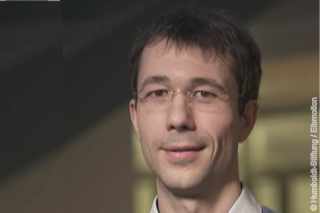Professor Dr Malte Gather, director of the Humboldt Centre for Nano- and Biophotonics at the Chemistry Department of the University of Cologne’s Faculty of Mathematics and Natural Sciences, has been awarded an ERC Advanced Grant for his research project ‘Challenging the fundamental limit of angular dispersion by hybridizing light and matter’ (HyAngle). The ERC Advanced Grant, which provides 2.5 million euros in funding, is the most prestigious research prize of the European research landscape. “This is a huge success for my team,” Gather remarked. “It will allow us to pursue a truly novel approach in the years to come, hopefully applying concepts of quantum mechanics and nanophotonics to the life sciences in unprecedented ways.”
Optical interference is one of the most fundamental properties of light. It describes how light waves can be superimposed in such a way that the resulting wave is deliberately amplified or attenuated. Interference is at the heart of numerous optical systems in science and industry, whether for the detection of gravitational waves, even faster internet, or in objects of everyday use such as the anti-reflective coating on eyeglass lenses.
Gather and his team will explore ways to overcome a thus far unchallenged law of physics, the so-called angle dispersion, which is a headache for engineers in the development of many practical applications. The group relies on the concept of strong coupling from quantum mechanics, mixing light with the electronic states of various materials to achieve new quantum states.
What sounds abstract actually has a number of practical advantages. A few weeks ago, Gather and his team published results leading up to the research pursued within the ERC Advanced Grant in the journal Nature Photonics. They showed how a similar concept can be used to develop better smartphone, computer and TV screens that display images with more brilliant colours without losing energy efficiency or changing colour under different viewing angles.
With the funding provided by the ERC Advanced Grant over the next five years, Gather and his team have plans that go far beyond display technology: Besides gaining a better understanding of strong coupling, the group wants to explore possible applications in future biosensors and implants that use light to, e.g., make the interactions of neurons in the brain visible.
Malte Gather studied at Imperial College London and received his doctoral degree from the University of Cologne. Following research work at the University of Iceland, Harvard University and the Technical University of Dresden, he became a full professor at the University of St Andrews in Scotland in 2013. In October 2019, he returned to Cologne as an Alexander von Humboldt Professor to establish a new research centre for nano- and biophotonics. Besides numerous academic awards, he is listed in the Guinness Book of World Records for his invention of so-called living lasers.
The ERC Advanced Grant is awarded to outstanding scholars and scientists for projects that promise ground-breaking results but carry a certain risk of failure due to the novelty of the chosen approach. To be eligible, candidates must apply with a European research institution and must have demonstrated excellent research results over at least ten years. The selection is largely based on the originality and the scientific impact of the expected contribution.
Media Contact:
Professor Dr Malte Gather
Humboldt Centre for Nano- and Biophotonics
Department of Chemistry, University of Cologne
+49 221 470 76449
malte.gatheruni-koeln.de
Press and Communications Team:
Eva Schissler
+49 221 470 4030
e.schisslerverw.uni-koeln.de
Further information:
Press release of the European Research Council
Gather Lab and Humboldt Centre for Nano- and Biophotonics
